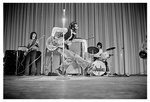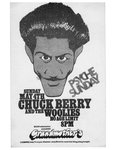


Although legendary guitarist and lyricist Chuck Berry is purported to be in rock ‘n’ roll heaven, it’s likely he’s still duck-walking in purgatory.
A new biography, “Chuck Berry: An American Life,” by RJ Smith, tells the story of his rich career and frequent attempts to avoid the long arm of the law.
Berry didn’t emerge but rather exploded into stardom with his 1955 hit, “Maybellene,” which became a fixture on nascent rock stages across the country.
During his prime, he played numerous shows in Lansing and across Michigan. In 1958, he appeared at the Lansing Civic Center as part of concert promoter Alan Freed’s “Big Beat Show” tour alongside Buddy Holly, Jerry Lee Lewis and many other greats.
Some 10 years later, on Aug. 12, 1968, a tour brought him to The Dells, a roadhouse on Lake Lansing that was reinventing itself as a concert venue. It was there he met a local group, The Woolies, that was on the fringes of stardom itself until the vagaries of the industry relegated it to record store dustbins.
That fateful night, the band was in the audience to watch Berry. He showed up as usual, carrying only his Fender guitar. As he traveled, he would rely on venues to provide a backup band and two Fender Dual Showman Reverb speakers. He started out with a local psychedelic band, The Scarecrows, but didn’t like them and asked The Woolies to fill in. He ended up keeping them around for his several-night gig.
(Writer’s note: I was at The Dells on what was a quiet Tuesday night until Berry took the stage. I was sitting at the center table in the first row with a couple of buddies who sold the venue State News advertisement slots. It was so fantastic that we would go back several times that week. Hearing Berry on a tinny transistor was one thing, but seeing and hearing him in person was a whole other level. And when he kicked back and did his duck walk across the stage? Well, it was surreal.)
The Woolies would later play two concerts with Berry at Grandmother’s in Lansing, now the site of a rental behemoth on Michigan Avenue, and other gigs across Michigan and the Midwest at the Fox Theatre, the Grande Ballroom, the Michigan State Fairgrounds and even an open-air concert at Wrigley Field in Chicago.
The Woolies’ keyboardist and harpist, Bob Baldori, said the band made more than 100 appearances with Berry. In 1971, the artist visited Baldori’s southside Lansing Sound recording studio to lay down some tracks.
For Baldori, playing with and becoming a personal friend of Berry are major highlights of his life. When Berry died in 2017, Baldori delivered one of the many eulogies at his funeral.
Smith interviewed 100 musicians and industry executives for the book, including Baldori, who appears on a couple of pages.
When Smith writes about Berry’s music, his words glow, but he also details the many lurid scandals and run-ins with the law that followed Berry like a cartoon rain cloud, including the infamous women’s bathroom recordings he was purported to have made at his nightclub in St. Louis.
“Berry could be ornery and demanding. He wanted his cash upfront. He’d been burned too many times,” Smith wrote.
Berry landed in prison in 1963 after transporting a 14-year-old girl across state lines for allegedly “immoral purposes.” Incarceration wasn’t so bad, though. He had plenty of time to write and practice, and his music earned him royalties from being covered by The Rolling Stones, The Beatles, The Beach Boys and even Gerry and the Pacemakers.
Perhaps the ultimate irony was the success of Berry’s cover of Dave Bartholomew’s “My Ding-a-Ling,” which climbed to No. 1 on the Billboard Hot 100 chart in 1972.
Much of Berry’s musical success was due to his often-suggestive lyrics, which were a perfect partner to the sexual freedom sought by his fans, Smith said.
Reflecting on the more than 50 years he worked and traveled with Berry, Baldori said, “He was a real genius and had a preternatural feel for rhythm, improvisation and syncopation. He may not have invented rock ‘n’ roll, but he polished it and popularized it.”
Support City Pulse - Donate Today!
Comments
No comments on this item Please log in to comment by clicking here